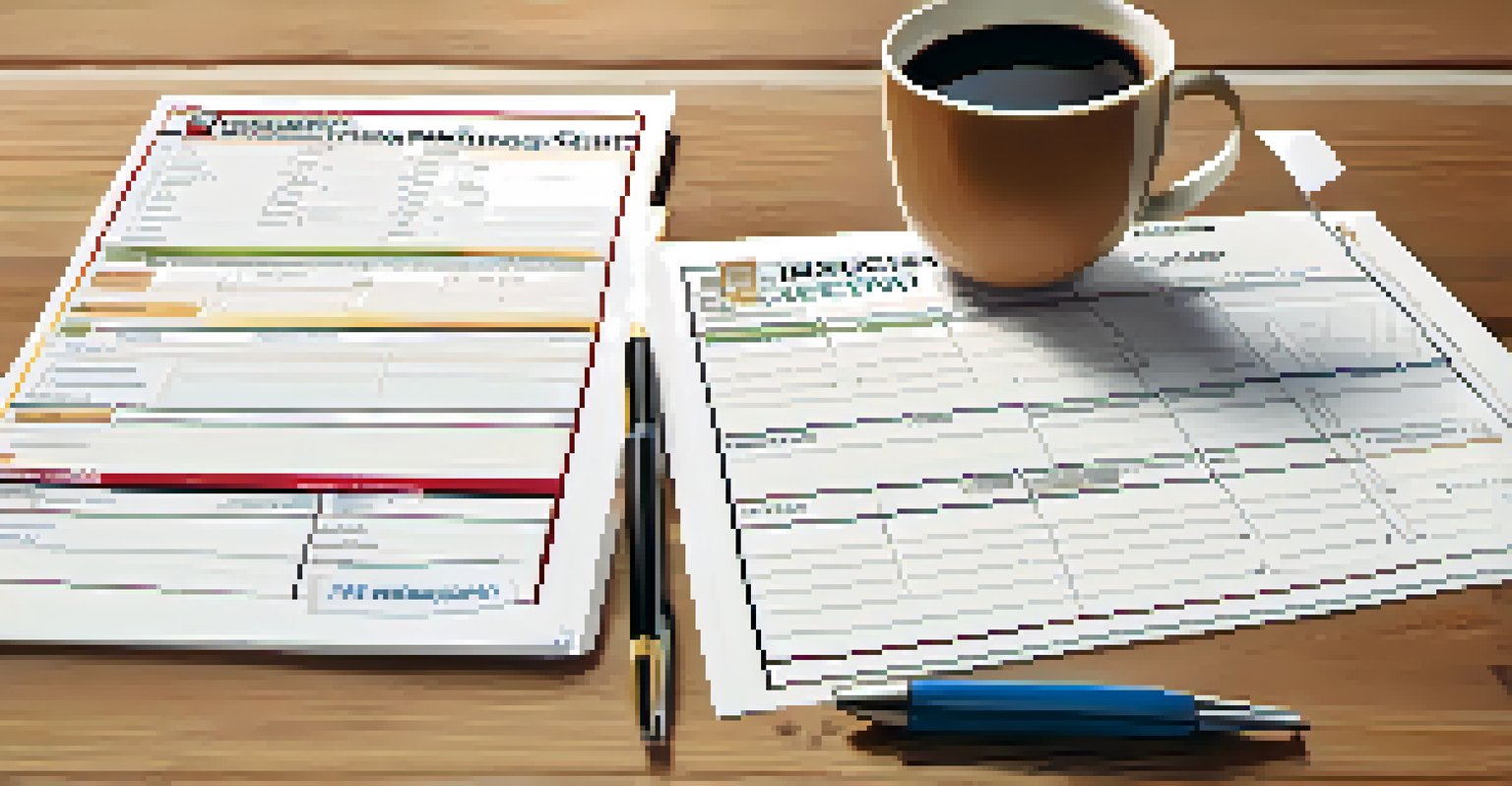Preparing for a Home Inspection: A Renovator's Checklist

Understand the Home Inspection Process and Its Importance
A home inspection is a crucial step in the buying or selling process, providing an in-depth look at the property’s condition. It helps identify any issues that may need fixing, which can save you from unexpected costs down the line. Understanding what inspectors look for can help you prepare your home and make necessary repairs ahead of time.
An ounce of prevention is worth a pound of cure.
Inspectors will examine everything from the roof to the foundation, assessing structural integrity, electrical systems, plumbing, and more. By familiarizing yourself with the common problem areas, you can prioritize your renovations. Remember, an informed approach not only enhances your home’s value but also gives potential buyers peace of mind.
In short, knowing the process can empower you to take action. Consider it your chance to showcase your hard work and investments in renovations, while also addressing any lingering issues that might deter buyers.
Create a Comprehensive Renovation Checklist
Before the inspection, it’s a good idea to create a thorough checklist of all areas you’ve renovated or plan to renovate. This can include everything from minor cosmetic changes to major structural updates. Having this list handy will ensure that you cover all bases and provide the inspector with a clear overview of your improvements.

Include details such as the age of the roof, updates to electrical systems, or new plumbing installations. This not only demonstrates your diligence but also helps the inspector assess the current state of your renovations accurately. You might even consider taking photos of before-and-after scenarios to further illustrate your work.
Importance of Home Inspections
A home inspection is vital for identifying potential issues that can save you from unexpected costs in the buying or selling process.
A well-organized checklist can also serve as a conversation starter during the inspection, allowing you to discuss the renovations in detail. This proactive approach can instill confidence in potential buyers about the quality of your improvements.
Address Common Problem Areas Before the Inspection
Certain areas of a home are notorious for raising red flags during inspections. For example, issues with the roof, plumbing leaks, or outdated electrical systems can lead to significant concerns. Before the inspection day, take a close look at these potential problem areas and address any obvious issues.
The best way to predict the future is to create it.
If you notice any leaks under sinks or signs of water damage on walls, it’s best to tackle these repairs beforehand. Similarly, check the electrical panel for outdated wiring or circuit overloads, which could pose safety hazards. By proactively resolving these issues, you enhance your home’s appeal and reduce the chances of costly negotiations post-inspection.
Remember, a little effort goes a long way. Taking the time to fix common problem areas not only prepares your home for inspection but also boosts your confidence when it comes time to showcase your hard work.
Ensure All Documentation is Ready and Accessible
Having all relevant documentation organized and readily accessible can make a world of difference during a home inspection. This includes warranties for appliances, service records for HVAC systems, and permits for any renovations you've completed. Presenting this information not only demonstrates your commitment to maintaining the property but also reassures the inspector.
Consider creating a binder or digital folder that contains all necessary documents. This can streamline the inspection process, allowing the inspector to verify your renovations and any associated warranties with ease. Being organized can also enhance your credibility, showing that you’ve taken your responsibilities seriously.
Prepare a Renovation Checklist
Creating a detailed checklist of renovations helps provide clarity to inspectors and showcases your diligence in maintaining the property.
Ultimately, thorough documentation can help clarify any questions that arise during the inspection. It can also serve as a valuable resource for prospective buyers, providing them with peace of mind regarding their investment.
Conduct a Pre-Inspection Walkthrough of Your Home
Before the official inspection day, conduct your own walkthrough of the property. This gives you the chance to identify any visible issues and address them proactively. Pay attention to the details, such as cracks in walls, signs of mold, or any unusual odors, as these can be red flags during the inspection.
During your walkthrough, pretend to be the inspector and scrutinize every corner of your home. Look for anything that might raise questions or concerns. If you identify issues, consider hiring a professional to address them before the inspection takes place, ensuring your home is in its best condition.
This self-assessment not only increases your chances of a successful inspection but also provides you with the opportunity to take pride in your renovations. After all, your hard work deserves to shine!
Clean and Declutter Your Home Before the Inspection
A clean and clutter-free home can significantly impact the impression made during a home inspection. Take the time to tidy up and declutter each room, as this allows the inspector to access all areas easily. A clean environment also reflects well on your maintenance habits and can enhance the overall perception of your renovations.
Focus on areas that may have accumulated dust or debris over time, such as attic spaces or basements. Clear pathways, organize spaces, and ensure that the inspector can easily navigate through the home. A clean home not only looks better but also can help you spot issues that might have gone unnoticed amidst the clutter.
Follow Up on Inspection Results
Promptly reviewing the inspection report and addressing any concerns demonstrates transparency and commitment to potential buyers.
In addition, a well-presented home allows potential buyers to visualize themselves living there, enhancing their emotional connection to the property. A little effort in cleaning can lead to a smoother inspection process and a more favorable outcome.
Be Present and Open During the Home Inspection
On the day of the inspection, it’s beneficial to be present and available for any questions the inspector may have. This allows you to provide context for your renovations and share any challenges you encountered during the process. Open communication can foster a positive relationship with the inspector, making it easier for them to understand your home’s story.
Being present also gives you the opportunity to address any concerns or clarifications on the spot. If the inspector identifies an issue, you can discuss it immediately and provide any relevant documentation. This proactive approach can pave the way for smoother negotiations later on.

Ultimately, your willingness to engage demonstrates your commitment to maintaining the property. A positive interaction can leave a lasting impression, benefiting both you and potential buyers.
Follow Up on the Inspection Results and Next Steps
Once the inspection is complete, it’s crucial to follow up on the results promptly. The inspector will provide a report detailing their findings, including any issues that need addressing. Review this report carefully, as it will guide your next steps and any necessary repairs or negotiations.
If the report highlights significant concerns, consider getting estimates for repairs before entering negotiations with potential buyers. This proactive approach can help you make informed decisions and showcase your commitment to resolving issues. Be prepared to discuss these findings with potential buyers to demonstrate transparency.
Following up on the inspection results not only helps you navigate the selling process more efficiently but also reinforces trust with prospective buyers. A clear plan for addressing any identified issues can enhance your home’s appeal and increase the chances of a successful sale.